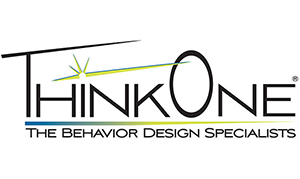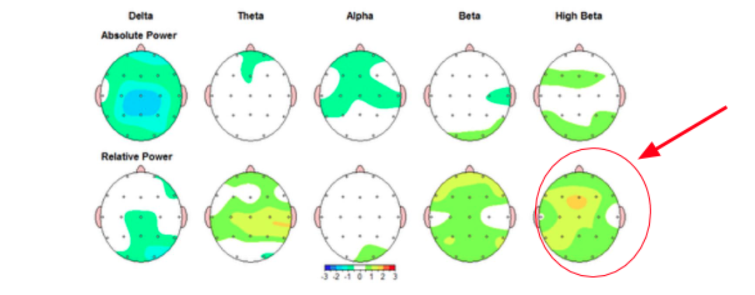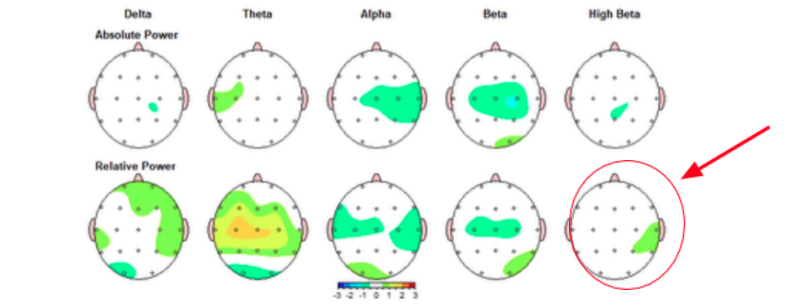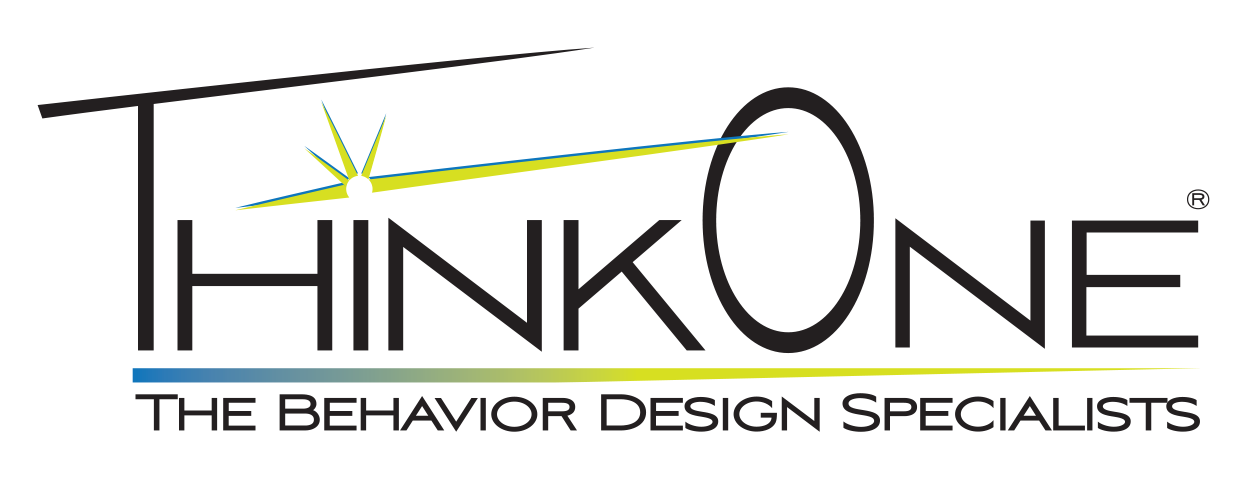Neurofeedback

“A Calm Mind is a Winning Mind”
*ThinkOne is the only neurofeedback organization in the State of Colorado who has a Board Certified Brain Surgeon that oversees all ThinkOne brain mapping / quantitative EEG’s
Before Neurofeedback
This is a qEEG of a young hockey player that struggled with anxiety. As you can see in the before, his high beta was overactive, which caused his anxiety.

After Neurofeedback

What Is Neurofeedback/Conditioning?
Neurofeedback/Conditioning strengthens, calms, and stabilizes the brain.
The overall goal of Neurofeedback is to improve neurological flexibility. The brain is optimally supposed to shift easily between states, from sleep, to relaxation, to calm, to alert, to high alert when needed. Once your brain is “trained,” it can then shift on its own (as opposed to being “stuck” in a state of anxiety, anger, etc.)
Dr. Daniel Amen, a well-known psychiatrist often seen on PBS, has written many books on the brain. He specializes in brain scans and recommends Neuro-feedback as the most ideal treatment option. Amen says that “a healthy brain tends to be: focused, happy, relaxed, loving, and effective while an unhealthy brain tends to be distracted, sad, anxious, angry, and not as effective.
According to Dr. Siegfried Othmer, a key researcher and clinician in Neurofeedback, claims that Neurofeedback not only helps restore healthier functioning, but prevents future neurological dysfunction due to severe trauma such as a concussion/TBI or cognitive decline due to aging.
We ALL want a Healthy Body and Brain! Conditions that Neurofeedback can Help:
- Peak Performance/Sport Performance
- Sleep
- Headaches/Migraines
- Dependency/Addiction
- Attention Challenges
- Concussion/TBI Recovery and Prevention
- Depression/Mood
- Anxiety
- Anger and Irritability
- Chronic Pain
- Instabilities/Cravings
- Trauma
- Sensory Integration
- Low Motivation
A Brief History
In 1968, Dr. Barry Sterman, a neuroscientist at UCLA medical school, proved that cats in his lab could be trained to make more EEG activity at 12-15 Hz frequencies (SMR). Sterman used the same cats for a NASA contract to investigate whether rocket fuel could cause seizure activity. The cats were exposed to a volatile fuel called hydrazine. Half of the cats seized in a predictable dose response curve. The other half of the cats (those who had increased SMR brainwaves in the last experiment) had no seizures. It was an unexpected outcome.
After additional research, Neurofeedback was tried on a woman working in Sterman’s lab, who suffered from uncontrollable seizures. She was trained at 12-15 Hz along the sensory motor strip. The training had the same inhibitory effect that it did on the cats and the woman subsequently qualified for a California driver’s license. These events launched the field of Neurofeedback.
How Does it Work?
First, we obtain a Quantitative EEG from our clients; this gives us a brain map helping us choose where to go and what to do first. We also take a comprehensive assessment of reported symptoms. With this quantitative and qualitative information, treatment protocols are determined
A Special EEG monitor and software are installed on two computers. A 19-channel cap is placed onto the head of the client and electrode gel is placed into each one of the holes for accurate and concise frequencies to be obtained. As the client relaxes and watches a game or movie, visual (the screen brightness fluctuating) and auditory (beeps or music) feedback rewards the client. It is research proven operant conditioning at its finest.
Neurofeedback is not electricity to the brain. Much like a stethoscope allows the user to hear the heart beating and measure the heart rate, the sensors we use allow the software to measure brainwave activity and convert them into brainwave patterns for us to read. Neurofeedback is also not traditional biofeedback. Biofeedback works on the conscious brain, concentrating on learning to relax, reduce blood pressure, etc. Neurofeedback works on the brain itself, opening up neuropathways (neuroplasticity) and creating new ones (neurogenesis) so the brain can function optimally. Research shows less stress in the body (i.e.: regulated cortisol levels) so a healthier you!
What is a qEEG / Brain Map?
Electroencephalography (EEG) is the measurement of electrical patterns at the surface of the scalp which reflect cortical activity (brainwaves). So, a Quantitative EEG (qEEG) is the analysis of the digitized EEG, also referred to as “Brain Mapping.” This information can be used by experts as a clinical tool to evaluate brain function, and track changes in brain function due to various interventions, one of them being Neurofeedback.
How long do the Effects last?
In general, the results are permanent. Once the brain has been properly trained, brainwaves like to stay where they are. After a client’s brain has gone through our Neurofeedback program, results seem to stick. Should there be a head injury, extreme stress, a serious disease, etc., occasionally an additional 5-10 “booster sessions” might be recommended in order to remind the brain where its “sweet spot” is.
Can Neurofeedback be done while on medication?
Yes, we start some clients while on medication. After a number of sessions, a reduction in medication dosage is usually implemented (under the supervision of your physician). Our clients on medication may begin to have symptoms of over-medication; therefore as their brain gets healthy they are no longer in need of the same amount of medication. For example: A 42-year old mom had been on four medications for years to treat depression. After 40 sessions of Neurofeedback, she was only using one medication at the lowest dose.
What are the costs and time commitments?
Training requires a minimum of two sessions per week during the early stages of the program. People can train five days a week, or do up to two sessions a day if they can make it work for their schedules. After a certain number of sessions, as advised by your neuro clinician clients can taper their sessions off until they finish the program. ThinkOne is passionate about making Neurofeedback affordable and accessible for everyone. Our rate is $150.00 per session. Also, ask about our family package rates! Most clients need between 25-40 sessions depending on progress to fully complete treatment.
What do the experts say?
“It is wonderful to see children and adults learn to regulate their brainwaves using Neurofeedback. This is the most exciting thing I have done in my career as a [mentalist]. Neurofeedback empowers people to make changes and achieve things that were just not possible for them before.”
“In my 38 years of practice, I have never seen any treatment that comes close to producing the results that Neurofeedback offers…I have seen results achieved in days and weeks that previously took months and years to achieve, using the best methods previously known to us.”
What do ThinkOne clients say?
“It changed my life! I found freedom from prescription medication, insomnia, anxiety, fear, bipolar mood swings, and anger. It opened my brain and allowed me to connect with a higher power. My entire life has improved so drastically. I no longer feel like I am disconnected. I have control over my emotions. Even my balance and coordination improved!” (25-year old female, bipolar disorder)“I was on so many drugs (Ritalin, Adderall, Concerta, Wellbutrin, Clonidine, Risperdal, Trilepal). I had no friends and always got into trouble at school. After neurotherapy I feel calm and happy. Life is better, I have friends, I am doing good in school. I get along with my parents and siblings better than ever before. I am off almost all of my medication.”
“From start to finish the support and education I received was life changing! I am eternally grateful for the person I’ve become and the eye opening conversations and tools Gina provided and had with me. It was easy to open up to both of them and through that my Neurofeedback sessions were even more successful! I loved coming here and I’m going to miss you!”
“Dr. P. and (ThinkOne) are cutting edge! It is using the latest technology to regulate our brainwaves without medication or other stimulants. I wish I knew about this earlier in my career! I highly recommend their services and coaching!”
“Thank you for everything you are doing and have done for my daughter. It means so much to have such great people care for her. Everyone at ThinkOne has such a passion and it shows in the care for your patients. It brings me to tears to know she is getting the help she needs and I truly see this changing our lives!”
“ThinkOne and Dr. P. have introduced me to an amazing therapy called Neurofeedback. In just a few sessions, I already feel better and can’t wait to get on the field and play better than I ever have. Everyone in the NFL, and all people who perform should be doing this work to be your best!”
“Neurotherapy has given my life back. I was so depressed and lethargic I had to force myself to get out of bed in the morning. Now, I am up each day with a smile on my face, raising my daughter like I always wanted to!”
In Closing
We have been individual, family, organizational, sport and school therapists, coaches and psychologists for years, and have looked at many alternative treatments. We found none with results as significant as Neurofeedback. Because of advances in technology, Neurofeedback is often the treatment of choice for many conditions—providing lasting results faster. For some clients, coaching and talk therapy is the treatment of choice. We also recognize that when people use coaching and/or counseling to supplement and accentuate their brain training, life change is undeniable.We will be happy to help evaluate what is the appropriate program for you!
In spirit & vision
Dr. Rick Perea, Ph.D., C.P.C. holds a Doctorate in Industrial/Organizational Psychology with a dissertation emphasis in Performance Psychology. He also holds three separate Masters’ Degrees in Psychology, Speech & Rhetoric and Educational Pedagogy, respectively. Dr. Perea is a highly acclaimed performance [mentalist] and presenter. He also is a Certified Professional Coach (CPC) who works with many individuals, teams and organizations across the United States. Further, he is a Certified Energy Psychologist (CEP) that employs progressive Eastern Medicinal Practices such as Acupressure and Tapping. He is a member of the following organizations: American Psychological Association (APA); Society of Industrial/Organizational Psychologists (SIOP); Association for Applied Sport Psychology (AASP); Society of Consulting Psychologists (SCP); and, the International Coaches Federation.
Dr. Monica Wehby, M.D., Fellow of the American Association of Neurological Surgeons, Fellow of the American College of Surgeons, Board Certified American Board of Neurological Surgeons, & American Board of Pediatric Neurological Surgery. Monica is a pediatric neurosurgeon with Legacy Medical Group-Children’s Neurosurgery. She earned her medical degree from Baylor College of Medicine, completed her neurosurgery residency at UCLA Medical Center and was awarded a neurosurgery fellowship at Primary Children’s Medical Center. She won the Congressional Medal of Distinction for improving children’s health and previously served as medical director of pediatric neurosurgery at The Children’s Hospital at Legacy Emanuel. She currently serves on the Statewide Governing Board of Ronald McDonald House Charities of Oregon and Southwest Washington
Greenwood Office Building
6888 S. Clinton St., Suite 102
Greenwood Village, CO. 80112
303.287.0933
